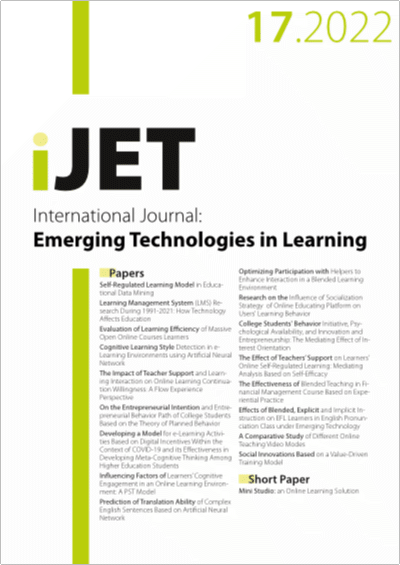Influencing Factors of Learners’ Cognitive Engagement in an Online Learning Environment
A PST Model
DOI:
https://doi.org/10.3991/ijet.v17i17.33851Keywords:
Online learning environment, Learners, Cognitive engagement, PST model, Technological affordance, Educational affordanceAbstract
This study used the Pedagogical Affordance-Social Affordance-Technical Affordance (PST) model as basis in designing a questionnaire to investigate the influencing factors of learners’ cognitive engagement in an online learning environment. Moreover, the influencing degrees of educational, social, and technological affordances on learners’ cognitive engagement in an online learning environment were estimated. Research results demonstrated that the overall Cronbach’s α of the questionnaire was 0.883, KMO was 0.859, and cumulative variance interpretation rate after rotation was 79.199%. Thus, the designed questionnaire has very good reliability and validity. Educational affordance can significantly improve learners’ superficial and deep learning engagements. Social and technological affordances can significantly increase learners’ superficial learning engagement, but they cannot significantly increase deep learning engagement. Online learning contact time has significant differences under the 1% and 10% levels. Research results can provide some references to explore the relationship between the PST model and cognitive engagement and improve the overall affordance of an online learning environment.
Downloads
Published
How to Cite
Issue
Section
License
Copyright (c) 2022 Lin Lin, JunYi Wang, XianYun Meng

This work is licensed under a Creative Commons Attribution 4.0 International License.



